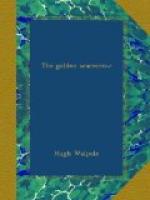In his sleep, at any rate, he was a hero; in the wide-awake world he was, in the opinion of almost every one, a fool. He was exactly the type of boy whom the Rev. William Lasher could least easily understand. Mr. Lasher was tall and thin (his knees often cracked with a terrifying noise), blue-black about the cheeks hooked as to the nose, bald and shining as to the head, genial as to the manner, and practical to the shining tips of his fingers. He has not, at Cambridge, obtained a rowing blue, but “had it not been for a most unfortunate attack of scarlet fever-----” He was President of the Clinton St. Mary Cricket Club, 1890 (matches played, six; lost, five; drawn, one) knew how to slash the ball across the net at a tennis garden party, always read the prayers in church as though he were imploring God to keep a straighter bat and improve His cut to leg, and had a passion for knocking nails into walls, screwing locks into doors, and making chicken runs. He was, he often thanked his stars, a practical Realist, and his wife, who was fat, stupid, and in a state of perpetual wonder, used to say of him, “If Will hadn’t been a clergyman he would have made such an engineer. If God had blessed us with a boy, I’m sure he would have been something scientific. Will’s no dreamer.” Mr. Lasher was kindly of heart so long as you allowed him to maintain that the world was made for one type of humanity only. He was as breezy as a west wind, loved to bathe in the garden pond on Christmas Day ("had to break the ice that morning"), and at penny readings at the village schoolroom would read extracts from “Pickwick,” and would laugh so heartily himself that he would have to stop and wipe his eyes. “If you must read novels,” he would say, “read Dickens. Nothing to offend the youngest among us—fine breezy stuff with an optimism that does you good and people you get to know and be fond of. By Jove, I can still cry over Little Nell and am not ashamed of it.”
He had the heartiest contempt for “wasters” and “failures,” and he was afraid there were a great many in the world. “Give me a man who is a man,” he would say, “a man who can hit a ball for six, run ten miles before breakfast and take his knocks with the best of them. Wasn’t it Browning who said,
“’God’s in His heaven,
All’s right with the world.’
Browning was a great teacher—after Tennyson, one of our greatest. Where are such men to-day!”




